Ornamental Crabapple Tree Varieties | Flowering Types
The bright foliage of flowering ornamental crabapple trees can add grandeur to any garden space. You may choose from the various varieties available.
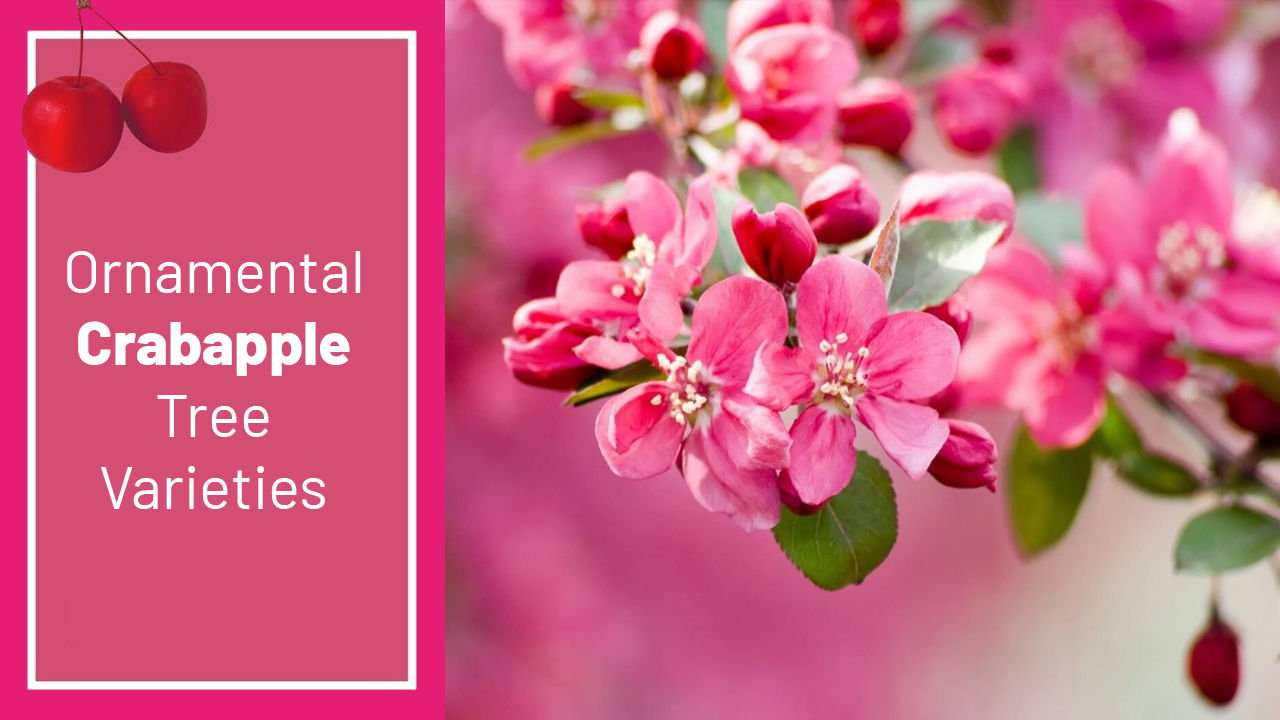
Ornamental flowering crabapple trees are highly valued for their visual appeal and can be a great addition to a garden or landscape. They come in a wide range of colors, sizes, and shapes, ranging from dwarf varieties that are less than 5 feet tall to large trees that can reach up to 30 feet or more.
There are likely millions of crabapple trees worldwide, as they are a common ornamental tree species and are planted in many regions for their beautiful flowers and fruit.
Some of the most popular flowering crabapple varieties include the Prairiefire, the Royal Raindrops, the Sargent, and the Red Jewel, among many others.
In addition to their attractive appearance, these trees can also provide food and habitat for birds and other wildlife, making them a great choice for those looking to create a more diverse and vibrant natural environment.
Crabapple trees are generally easy to grow and care for, but they do have some specific requirements. These trees grow well in well-drained soil and full sun. Though there are some varieties that can tolerate partial shade.
They should be watered regularly, especially during their first few years of growth, and may require occasional pruning to remove dead or diseased branches.
If you are curious to know more about the tree and its care conditions, without further ado, let’s take a look at ornamental crabapple varieties.
Crabapple Tree Identification
| Scientific name | Malus sylvestris |
| Crab apple tree size | 15 to 20 feet wide |
| Flowering crabapple leaf arrangement | Leaves are arranged in a pinnate manner |
| Fruits | Smaller in size as compared to regular apples. Green to Yellowish when ripened. |
| Crabapple tree height | 15 to 20 feet tall |
| Growing zone | Zones 4 through 8 |
Here’s how to spot a crabapple tree.
Ornamental Flowering Types Crabapple Trees
- Prairifire Crabapple Tree
- Spring Snow Crabapple
- Dolgo Crabapple
- Coralburst Crabapple
- Adirondack Crabapple
- White Cascade
- Callaway
- Adams Crabapple
- Velvet Pillar
- Red Jewel
- Golden Hornet
- Cardinal
- Sugar Tyme
- Snowdrift
- Sargent Tina
1. Prairifire Crabapple Tree
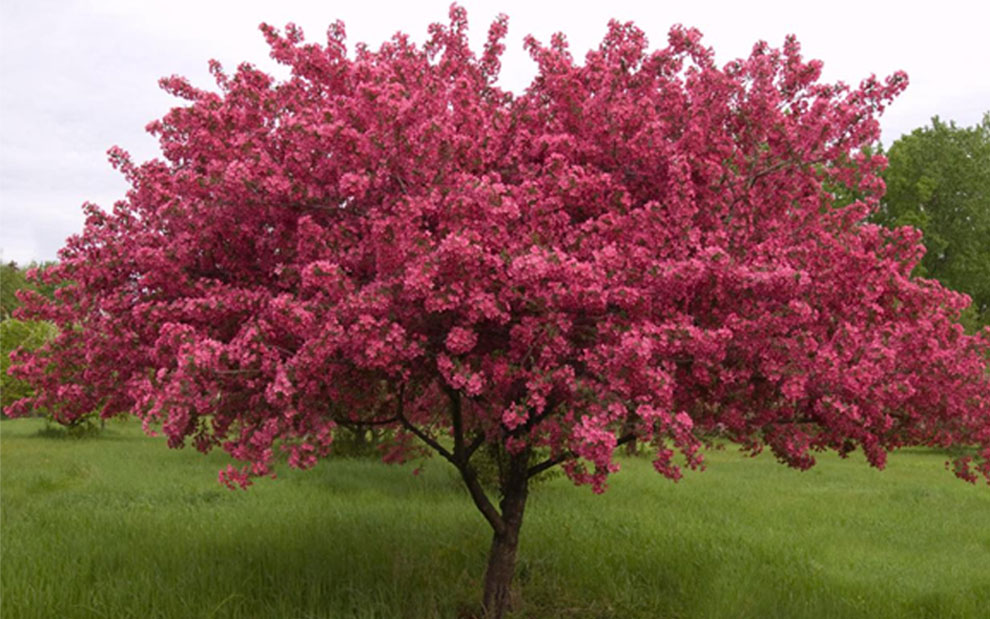
| Flower & foliage | Crimson buds with bright pinkish red,
single blossoms and red maroon, aging reddish-green leaves with serrated edges |
| Fruit | Dark red |
| Size | Height of 20 feet and spread of 20 feet |
The Prairifire crabapple tree is a deciduous tree that is native to North America. It is one of the popular ornamental crabapple tree varieties that is prized for its showy, deep-pink blossoms and dark red fruit.
Being a slow-growing tree, it typically adds less than a foot of height per year. The Prairifire crabapple tree prefers full sun and well-drained soil.
It is relatively drought-tolerant once established but should be watered regularly during its first few years of growth.
2. Spring Snow Crabapple
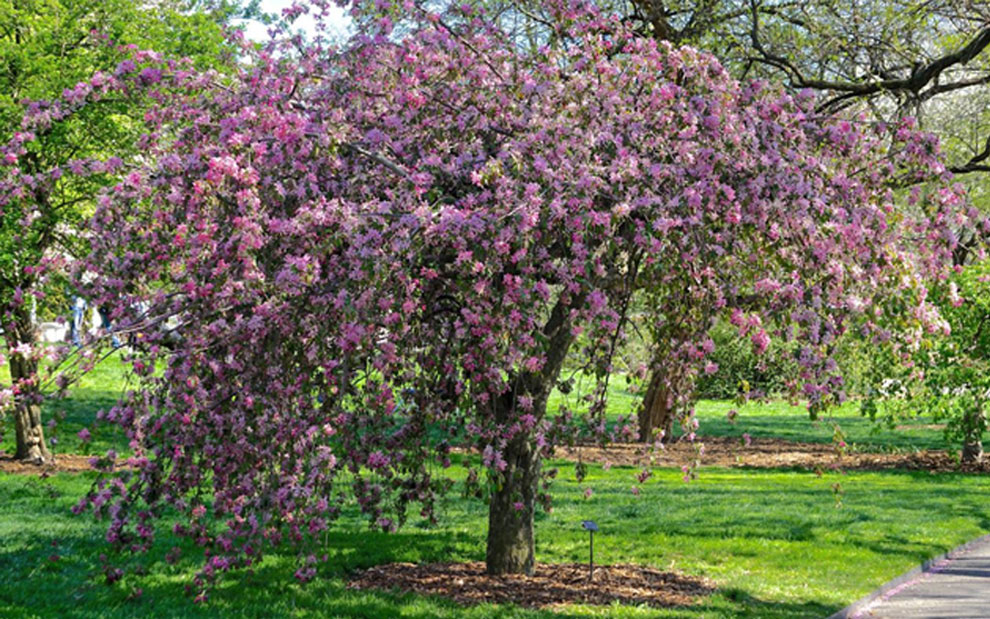
| Flower & foliage | Medium green foliage and pure white,
fragrant, single blossoms |
| Fruit | Nearly sterile |
| Size | Height of 25 feet and spread of 22 feet |
The Spring Snow Crabapple is a small deciduous tree that is known for its profuse white blooms in the spring. It is a cultivar of the flowering crabapple tree and one of the popular ornamental crabapple varieties found in gardens, parks, and landscapes.
It has a rounded shape and produces an abundance of fragrant white flowers in the spring, which can completely cover the tree and create a stunning display.
3. Dolgo Crabapple
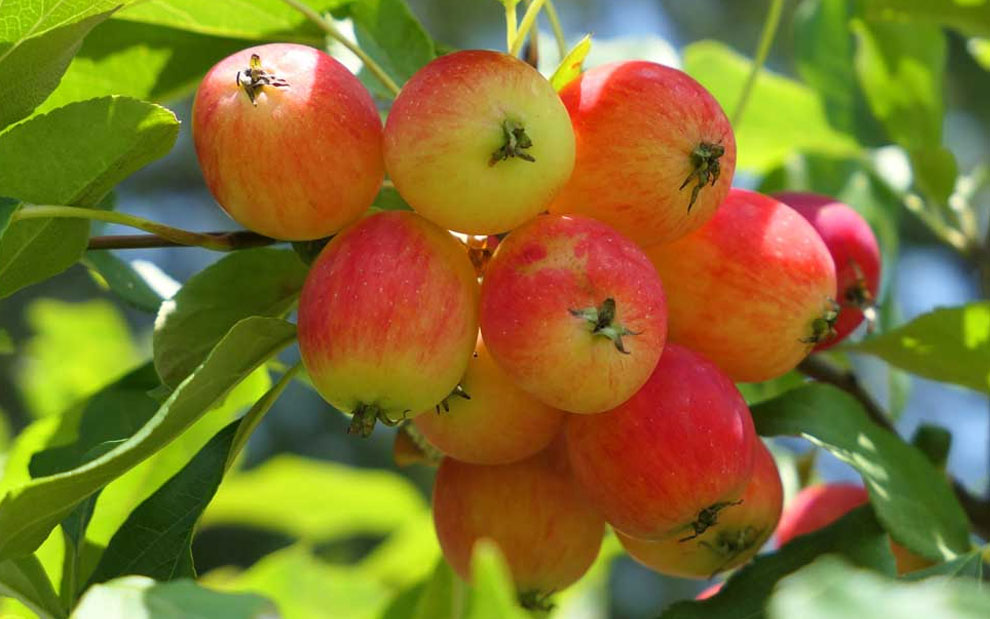
| Flower & foliage | Dark green, oval-shaped leaves with serrated edges and pink or white single-double flowers |
| Fruit | Small, round green fruit that turns bright red or yellow when ripe |
| Size | 25 feet high |
The Dolgo crabapple is a type of crabapple tree that is native to Central Asia and Siberia. It is also known as the Ussurian crabapple, after the Ussuri River in Russia, which is one of the areas where it grows.
One of the distinctive features of the Dolgo crabapple is its disease resistance. It is resistant to many of the common diseases that affect apple trees, making it a popular choice for orchards and gardens.
4. Coralburst Crabapple
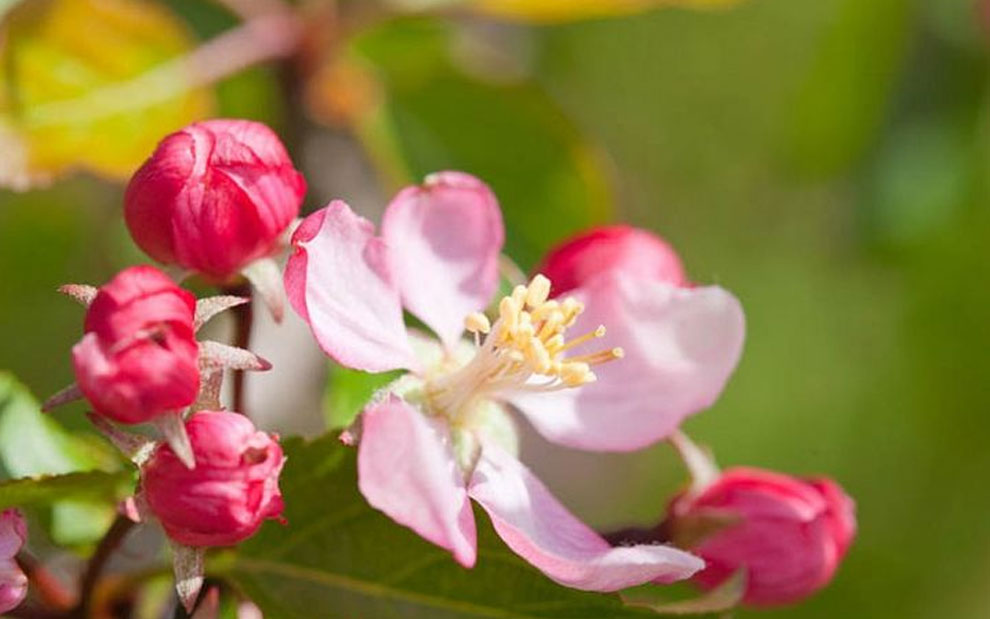
| Flower & foliage | Dark green foliage and coral pink buds with double rose-colored blossoms |
| Fruit | Yellow-green |
| Size | 15 feet tall and 15 feet wide |
The Coralburst Crabapple is one of the small ornamental crabapple tree varieties that is known for its compact size and attractive spring blooms. One of the benefits of the Coralburst Crabapple is its low maintenance requirements.
It is tolerant of a wide range of soil types and can thrive in full sun to partial shade. The Coralburst Crabapple is a beautiful and easy-to-care-for tree. It is a good option for planting in tight spaces or as a specimen tree in a container.
5. Adirondack Crabapple
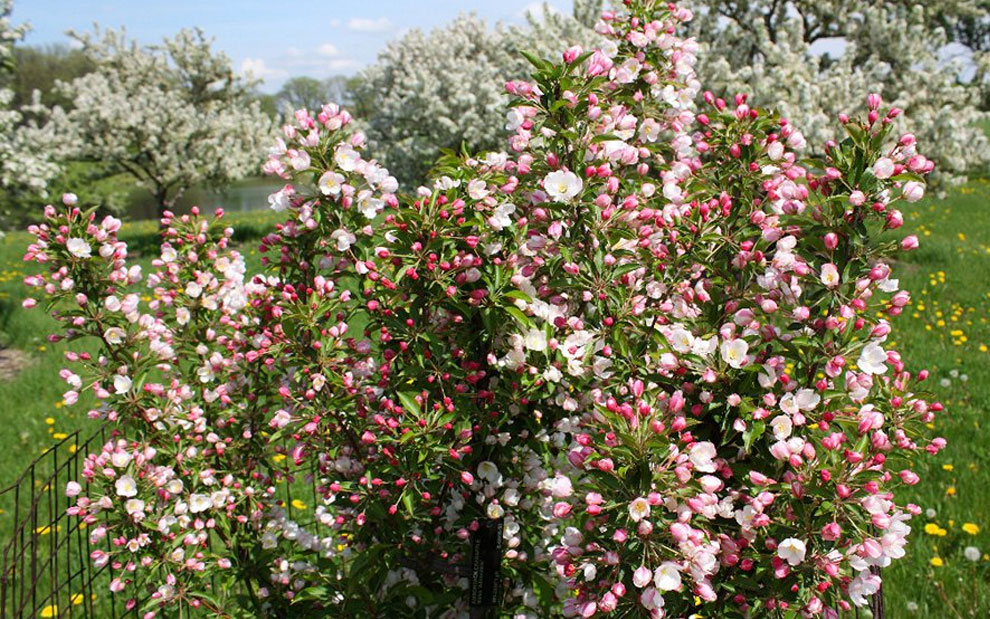
| Flower & foliage | Medium green foliage with white flowers |
| Fruit | Bright red |
| Size | 18 feet tall and 10 feet wide |
The Adirondack Crabapple is a small, ornamental tree that is known for its showy, pink blooms in the spring and its decorative fruit in the fall.
It has a spreading habit and produces an abundance of fragrant, pink flowers in the spring, which can completely cover the tree and create a vibrant display in your garden.
The tree likes well-drained soil and prefers full sun. It is tolerant of a wide range of soils.
6. White Cascade
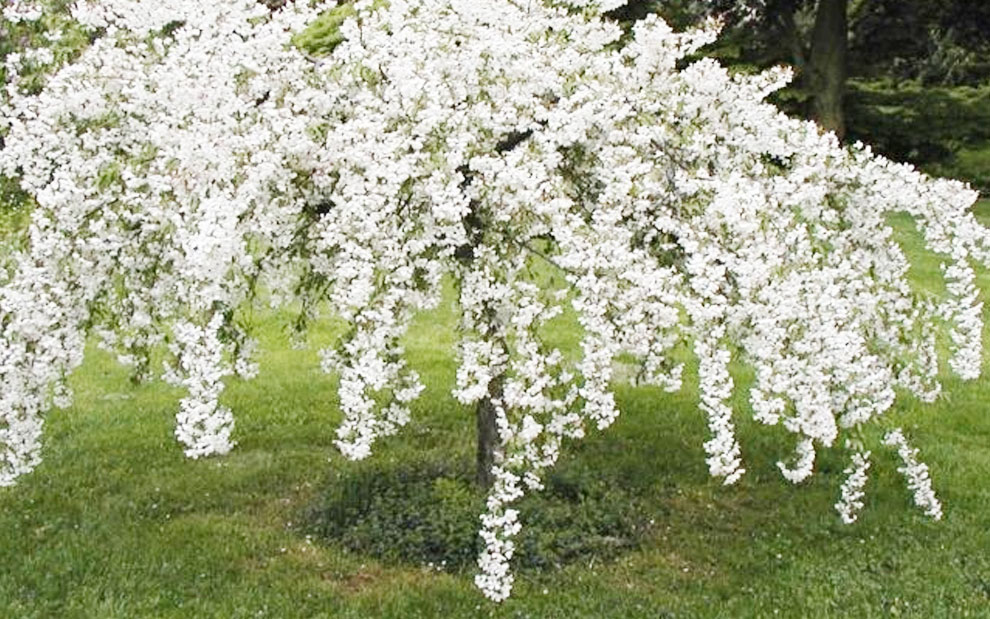
| Flower & foliage | Small oval-shaped medium green leaves and medium-sized white flowers |
| Fruit | Small, red fruit |
| Size | 15 feet tall and 15 feet spread |
The White Cascade Crabapple tree is a small, ornamental tree that is prized for its profuse white blooms in the spring and its attractive cascading branches.
One of the unique features of the White Cascade Crabapple is its cascading branches, which give the tree a weeping or cascading appearance. The branches are covered in green foliage in the summer, which turns yellow or orange in the fall before dropping for the winter.
Its stunning spring blooms, cascading branches, and decorative fruit make it a popular choice for gardens, parks, and other landscapes.
7. Callaway
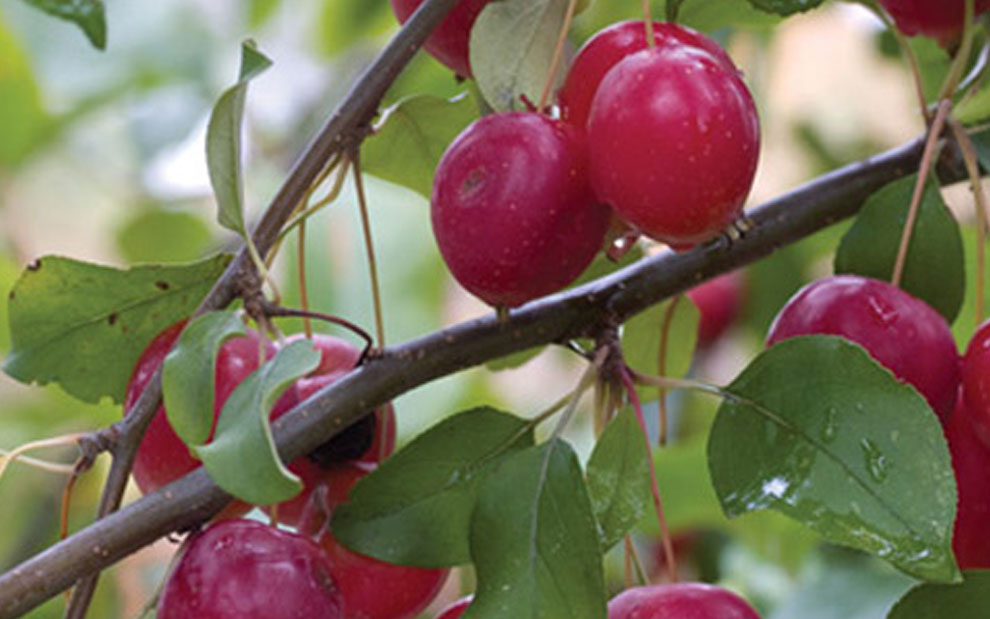
| Flower & foliage | Dark green foliage with white, fragrant flowers with five petals |
| Fruit | Large red fruit |
| Size | 15-25 feet height |
Callaway is one of the flowering crabapple tree varieties that is known for its striking white flowers and dark green foliage.
In the spring, the Callaway crabapple produces an abundance of white, fragrant flowers, while in summer the tree produces small green fruit that turns a bright red color in the fall.
The fruit is edible but is usually too sour to be eaten fresh. Callaway Crabapple trees have a dense, compact habit and require little pruning.
8. Adams Crabapple
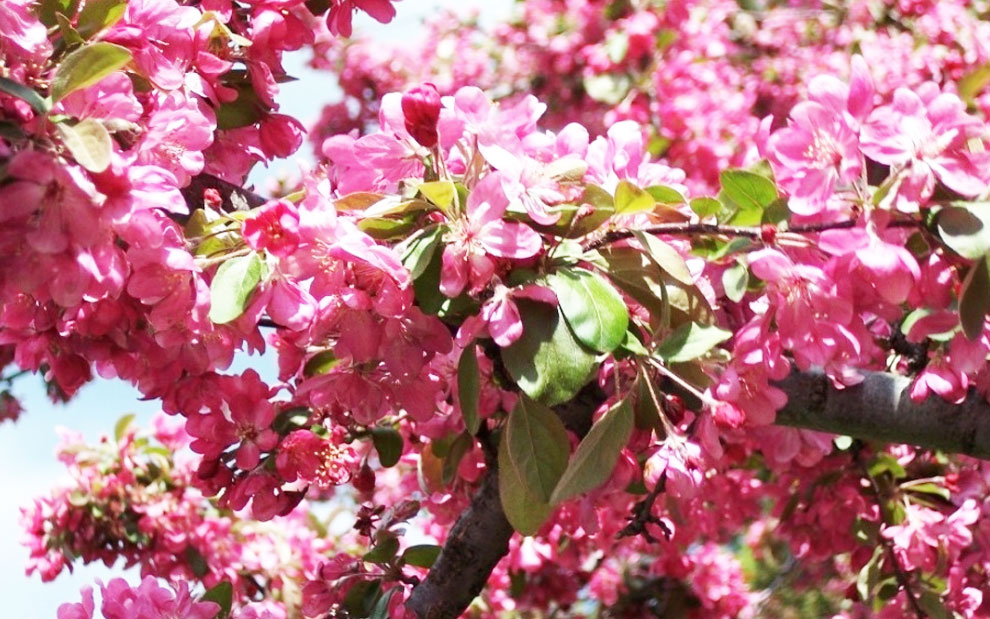
| Flower & foliage | Green leaves with a reddish tint in spring and deep pink buds open to pink blooms, single blossoms |
| Fruit | Red and persistent |
| Size | 20 feet in height and width |
The Adams crabapple is a small, ornamental tree that is prized for its profuse, pinkish-red blooms in the spring and its decorative fruit in the fall.
It has a rounded, spreading habit, and produces an abundance of fragrant blossoms in the spring. In the summer, the Adams crabapple produces small green fruit that turns a deep red color in the fall.
9. Velvet Pillar
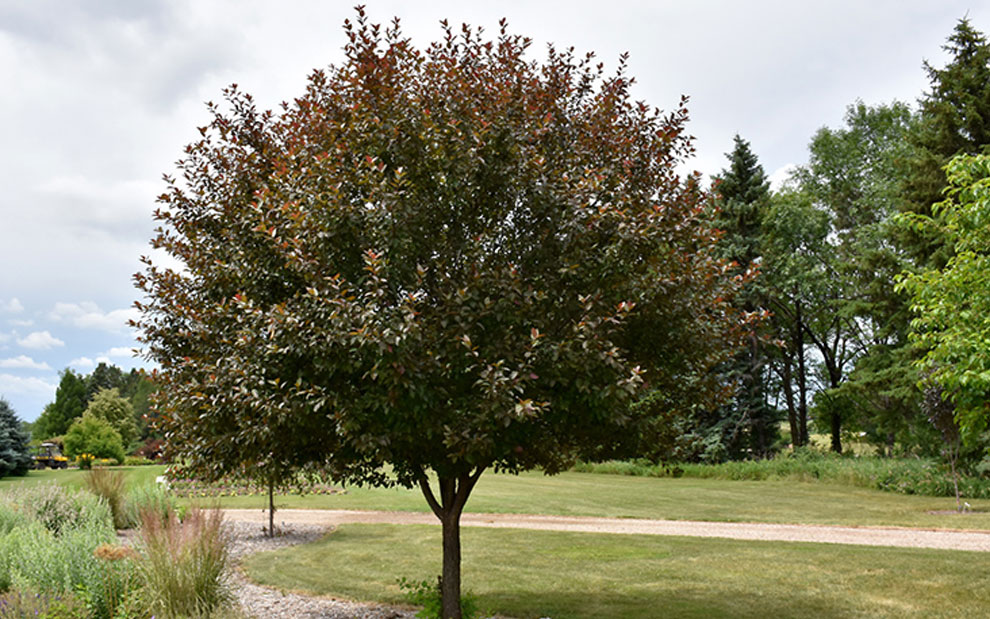
| Flower & foliage | Deep purple foliage with single pale pink flowers |
| Fruit | Crimson red fruit |
| Size | 20 feet tall and 12 feet wide |
Velvet Pillar is one of the narrow, columnar types of flowering crabapple trees known for their upright growth habit and showy spring flowers. This tree is an excellent choice for small gardens or as a vertical accent in a larger landscape.
Velvet Pillar requires little pruning to maintain its shape and is resistant to many common diseases and pests. Full sun and well-drained soil are perfect for the tree. It can also tolerate a wide range of soil types and growing conditions.
10. Red Jewel
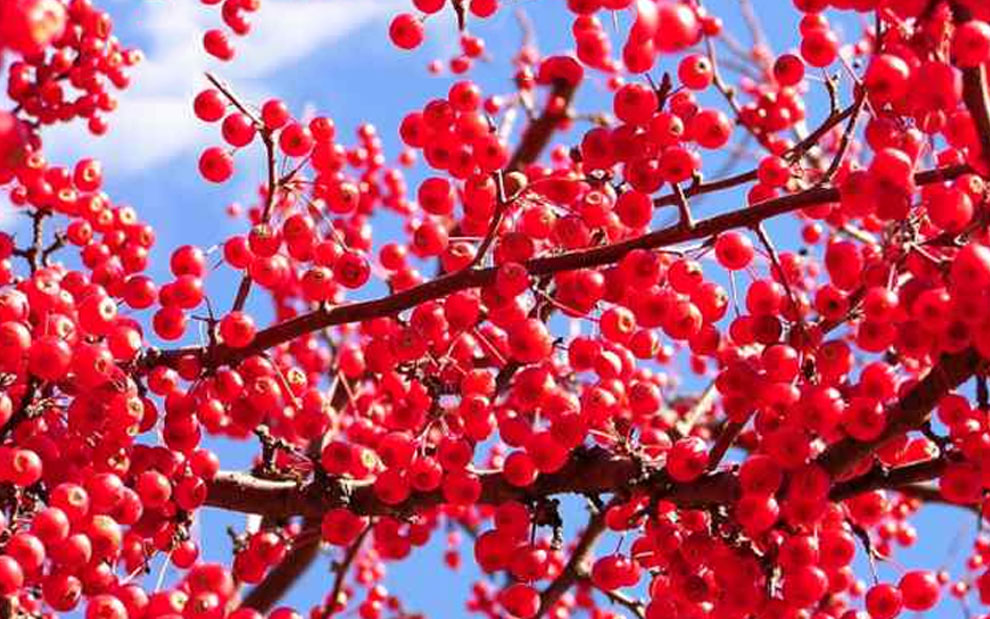
| Flower & foliage | Oval leaves in medium to dark green color with serrated edges. Pure white or pinkish-white single flowers |
| Fruit | Bright red |
| Size | 15 feet tall and 12 feet width |
The Red Jewel Crabapple is a popular cultivar of crabapple trees that are grown for its ornamental value. It is one of the stunning white flowering crabapple tree varieties in spring. Its bright red fruit adds a pop of color to the landscape in the fall.
The tree’s compact size and attractive form make it an excellent choice for small yards, as well as for use as a street tree.
11. Golden Hornet
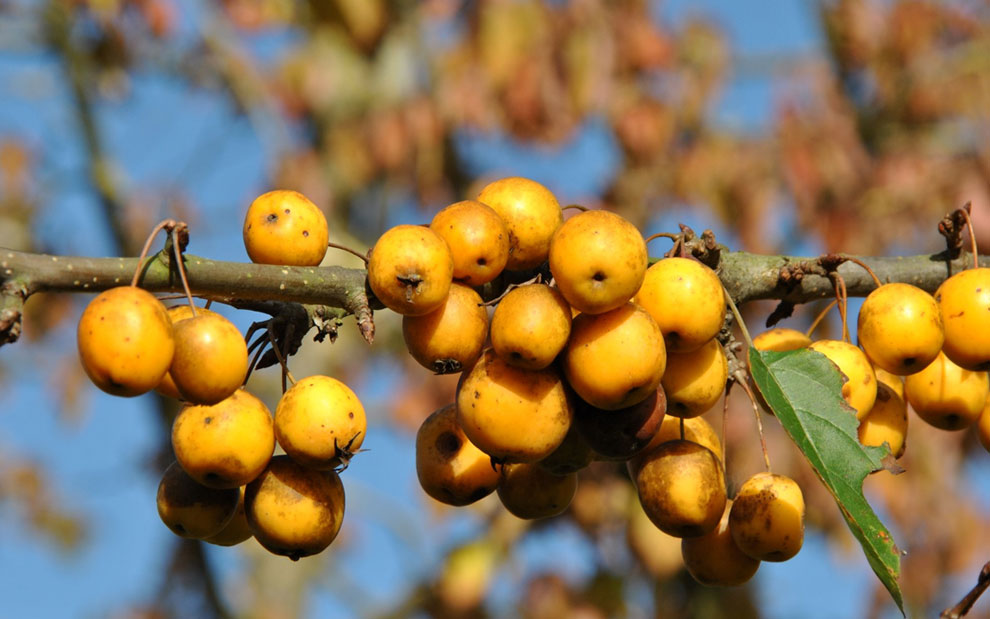
| Flower & foliage | Glossy, green leaves that turn yellow in fall. Pure white blossoms |
| Fruit | Deep yellow |
| Size | 25-30 feet tall, 20-25 feet spread |
Golden Hornet is popular for its striking yellow fruit, which persists on the tree well into the winter months. In addition to its fruit, Golden Hornet is also prized for its attractive white or pinkish-white flowers, which typically appear in the spring.
With its attractive fruit, beautiful flowers, and hardy nature, Golden Hornet is one of the ornamental crabapple tree varieties for gardeners looking for a versatile and visually striking tree.
12. Cardinal

| Flower & foliage | Toothed green leaves, large deep red flowers |
| Fruit | Bright red |
| Size | 15 feet tall and 25 feet wide |
The Cardinal Crabapple is known for its brilliant red flowers. It blooms in mid to late spring, producing a profusion of large, deep red flowers that are borne in clusters. The flowers are typically followed by small, greenish-yellow fruit, which ripens to a bright red color in the fall.
With its brilliant red flowers, attractive fruit, and disease resistance, it is a great choice for gardeners who are looking for a visually striking and low-maintenance tree.
13. Sugar Tyme
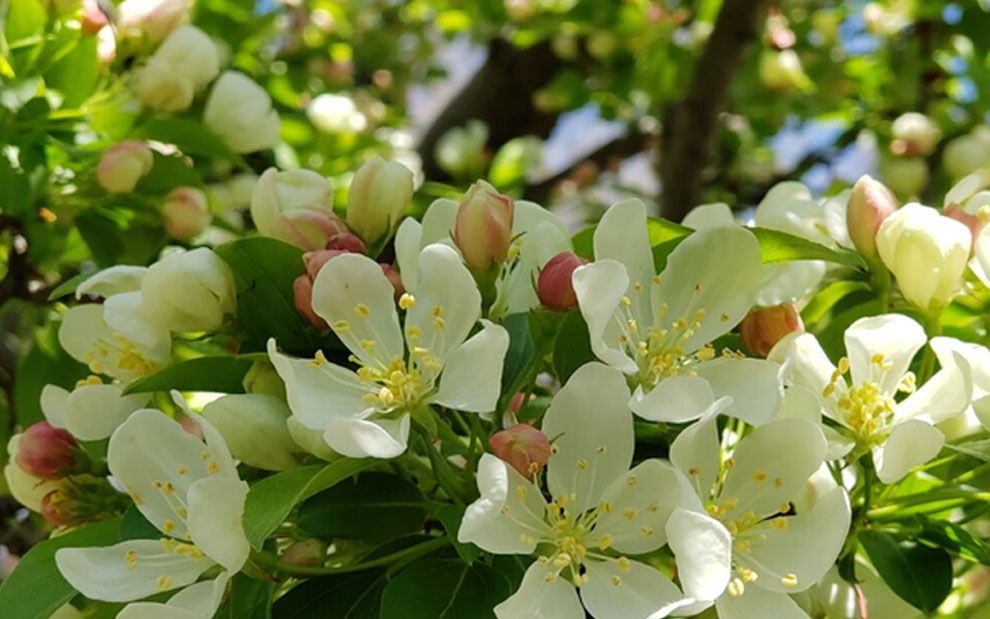
| Flower & foliage | Green leaves and pale pink buds, white, single flowers |
| Fruit | Red persistent |
| Size | 18 feet, 15 feet spread |
Sugar Tyme is one of the popular flowering crabapple varieties known for its profuse, fragrant white or pinkish-white flowers that bloom in early spring, followed by small red fruit that persist into winter.
The tree is small to medium-sized and is typically used as a specimen plant in gardens, parks, and other landscaped areas.
Sugar Tyme is known for its disease-resistant foliage, which remains green and healthy throughout the growing season, and its resistance to pests and environmental stressors.
14. Snowdrift
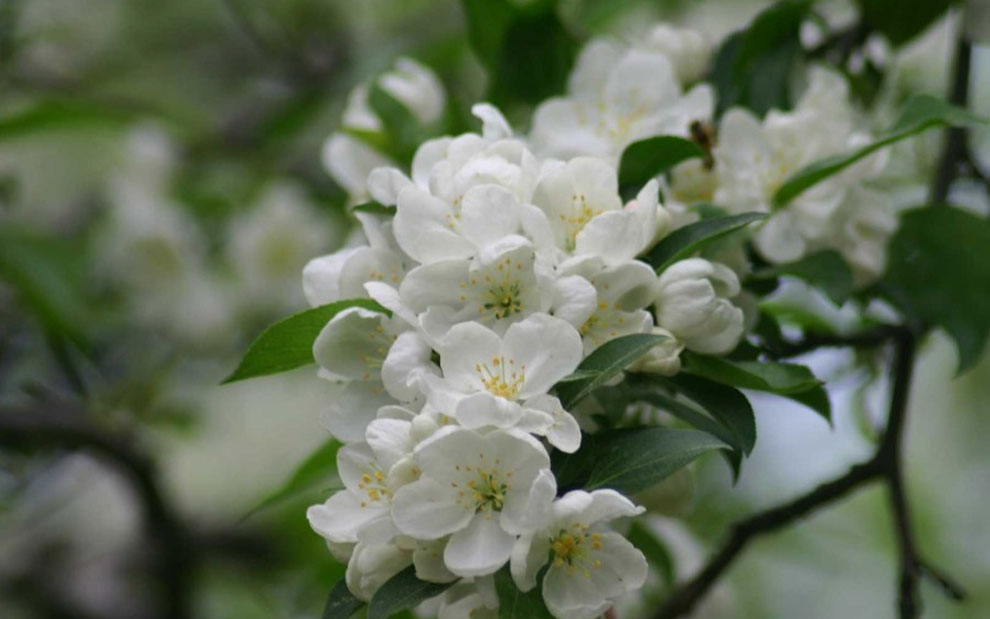
| Flower & foliage | Buds pink, single, white flowers and bright green glossy leaves |
| Fruit | Small, orange colored |
| Size | 20 feet tall, 20 feet spread |
Snowdrift is popular for its profuse, showy white flowers that bloom in early spring. The tree has a rounded, upright form, making it a good choice for use as an ornamental tree in gardens, parks, and other landscaped areas.
Snowdrift is known for their disease-resistant foliage, which remains green and healthy throughout the growing season, and its resistance to pests and environmental stressors.
15. Sargent Tina
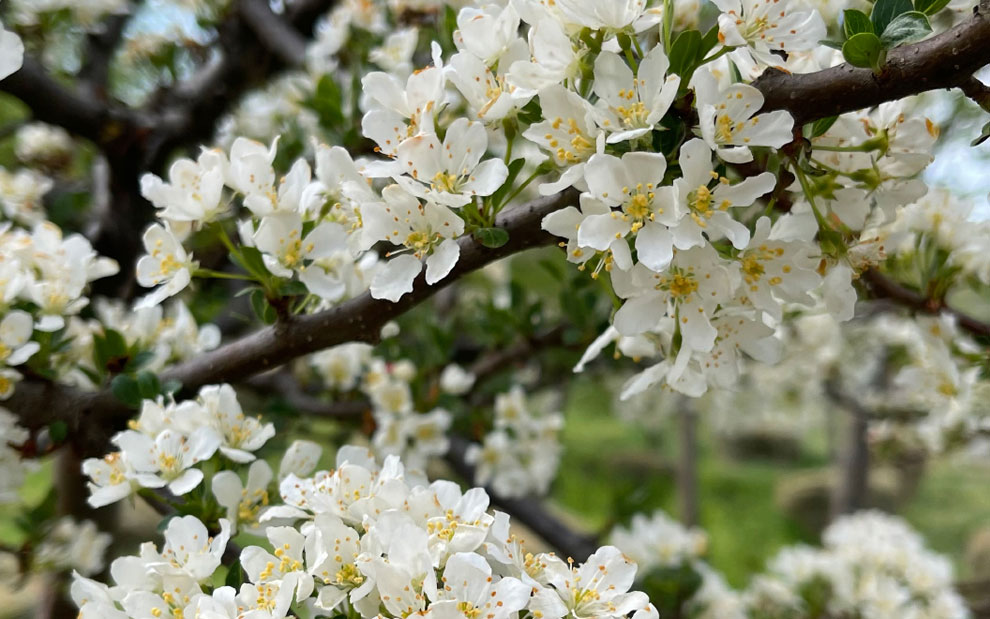
| Flower & foliage | Small, medium green leaves and bright red buds opening to single white blossoms |
| Fruit | Bright red |
| Size | 5 feet high, 6 feet spread |
Sargent Tina is known for its attractive pink buds that open into single, fragrant white flowers. These trees are generally disease-resistant and low-maintenance, making them a popular choice for small gardens, urban landscapes, and other areas where space is limited.
They can be used as a specimen trees or planted in groups for a dramatic effect. The fruit is small and not typically used for human consumption. The leaves are dark green and turn yellow in the fall, adding to the tree’s ornamental value.
Let’s look at some more flowering crabapple tree varieties:
- Donald Wyman Crabapple
- Lollipop Crabapple
- Firebird Crabapple
- Golden Raindrops Crabapple
- Harvest Gold Crabapple
- Ivory Spear Crabapple
- Marilee Crabapple
- Louisa Crabapple
- Purple Prince Crabapple
- Radiant Crabapple
Is There A Dwarf Crabapple Tree – Dwarf Crabapple Tree Varieties?
Yes, there are dwarf crabapple tree varieties that are suitable for small gardens or landscapes.
Dwarf crabapple trees typically grow to a height of 6-10 feet, with some varieties growing to as little as 3-4 feet. Some popular dwarf flowering crabapple varieties include Sargent Crabapple, Prairiefire, Coralburst, Adirondack and Indian Magic.
When selecting a variety, be sure to consider the tree’s size, shape, flower color, and fruit color, as well as its disease resistance and cold hardiness, to ensure that it is well-suited to your garden or landscape.
Are Ornamental Crabapple Trees Messy?
Ornamental crabapple trees can be somewhat messy, especially when the fruit drops from the tree in the fall. However, many newer cultivars have been bred to produce fewer or smaller fruits, which can help reduce the amount of mess.
Additionally, regular pruning can help keep the tree from becoming overgrown and producing too much fruit.
If you’re concerned about the potential mess of flowering crabapple varieties, you may want to consider choosing a cultivar that is known for producing fewer or smaller fruits and be prepared to do some light maintenance to keep the tree in check.
Related: Crabapple Tree Lifespan | Different Types of Flowers
Crabapple Tree Info
1. What is the most beautiful Crabapple tree?
Malus Floribunda (Japanese Crabapple) is one of the most beautiful deciduous trees. With a rounded, broad, and dense canopy boasting gorgeous single, pale, and pink blossoms opening from crimson buds, the Japanese Crabapple is one of the most popular types of flowering crabapple trees.
2. What is the best tasting Crabapple?
Dolgo is one of the best-tasting Crabapple trees used for syrups, cider, jelly and other items. However, it’s worth noting that the taste of crabapples can vary widely depending on factors such as ripeness, sugar content, and acidity levels.
3. Which are the disease-resistant Crabapple trees?
Several disease-resistant crabapple trees are available. Some of the most popular disease-resistant crabapple cultivars include:
- ‘Adirondack’: Resistant to apple scab and fire blight.
- ‘Candymint’: Resistant to apple scab and powdery mildew.
- ‘Prairiefire’: Resistant to apple scab, fire blight, cedar apple rust, and powdery mildew.
- ‘Sargent’: Resistant to apple scab and cedar apple rust.
- ‘Snowdrift’: Resistant to apple scab and powdery mildew.
It’s important to note that no tree is completely immune to disease, but these flowering crabapple varieties have shown good resistance to some of the most common crabapple diseases.
4. Do all varieties of Crabapple trees bear fruits?
Yes, all varieties of crabapple trees are capable of bearing fruit. However, the size and amount of fruit can vary greatly depending on the specific cultivar.
Some crabapple trees are grown primarily for their ornamental value and have small, inedible fruit, while others produce larger fruit that can be used for making preserves or jelly.
It’s important to choose a cultivar based on your specific needs and preferences, as well as the growing conditions in your area.
